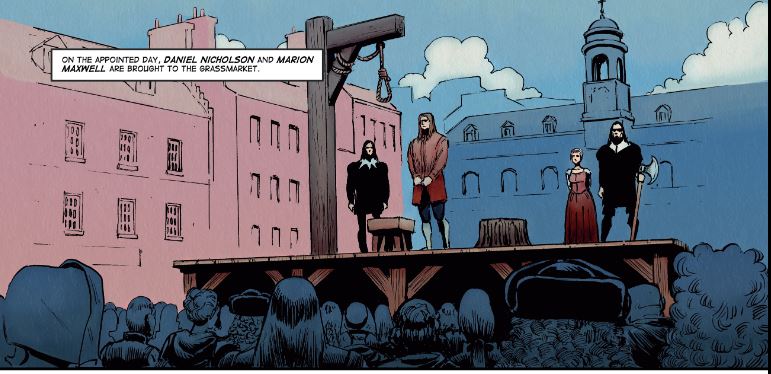SCOTLAND’S criminal past provides inspiration for a new comic book telling a historic story of sex and betrayal.
The Persecution of Jean Lands charts the conviction of Daniel Nicholson and Marion Maxwell, two lovers who plot to kill Nicholson’s wife so that they could be together.
The sensational trial, which took place in Edinburgh in 1694, saw the two accused of “notorious adultery.”

The case resurfaced through research by Dr Allan Kennedy following recent trips to the National Records of Scotland, which holds the records of the High Court of Justiciary.
Dr Kennedy, lecturer in Scottish History at Dundee, said: “Comics are a great way of sharing history.
“Because the illustrations carry so much detail, the storytelling can be incredibly efficient.
“That is hugely important when attracting a different kind of audience to that which may usually be drawn to history.
“This case is particularly interesting because it featured a charge that was quite rare and rather salacious.
“It also allows us to observe the social history of the time. Scottish history is often portrayed through the prism of a small number of famous events or figures.
“A case like this allows us to examine more everyday experiences away from big battles or the royal court.
“As well as showing how the judicial system worked, the files I have accessed touch on the local economy of Edinburgh at the time, how male and female relationships worked, and also the role of the church in society.
“These are fascinating insights into everyday life that are often overlooked when we talk about Scottish history.”
The 1694 trial of Nicholson and Maxwell evolved and brought in a third suspect, Dr John Nichol, a local apothecary whose involvement in the plot saw him charged with forgery.
Dr Kennedy discovered papers relating to the trial as he searched through High Court documents as part of a research project.
As Consultant Editor of History Scotland magazine, he collaborated with colleagues at both History Scotland and Dundee’s Comic Studies to bring the tale to a modern audience.
Dr Kennedy spent countless hours working with the court archives, he says that the attention to detail within Scotland’s judicial system at that time may surprise readers.
He added: “An interesting thing from examining these records is that the judicial system was much more sophisticated than we would likely expect.
“A large amount of care was taken in gathering evidence of guilt, and acquittals were not uncommon.
“While there was undoubtedly a brutal and bloody element in sentencing severe crimes, the expectation we may have today of torturous punishments being handed out with little consideration is not wholly accurate.
“The records that were kept from legal proceedings are also very detailed, with depositions being recorded verbatim and indictments being written with colourful and evocative language.
“It is very different from the way criminal justice in the past is often portrayed in today’s popular media.”
